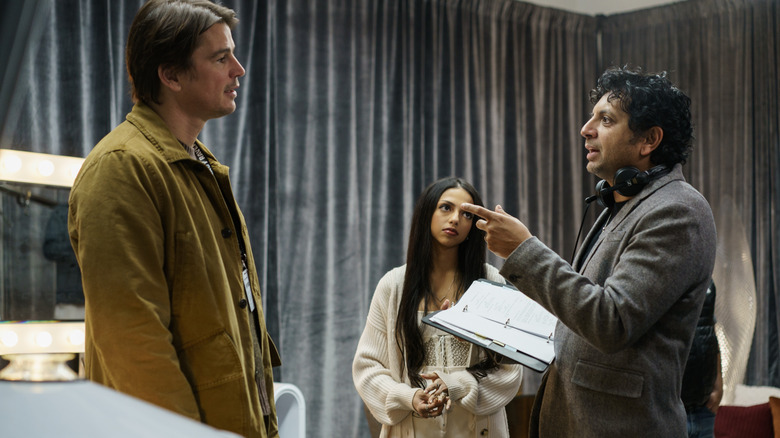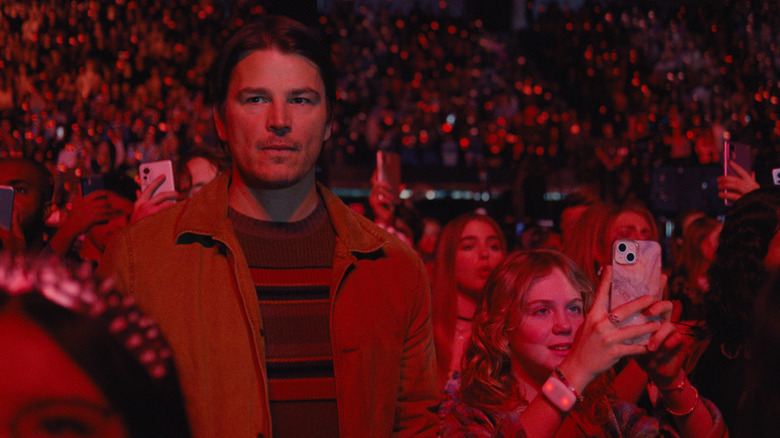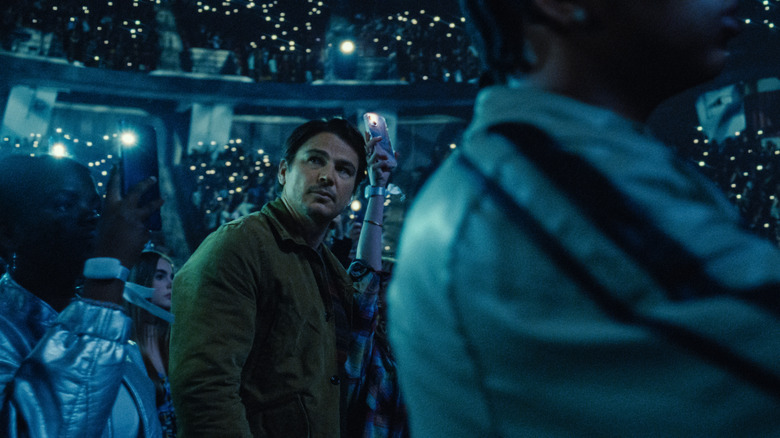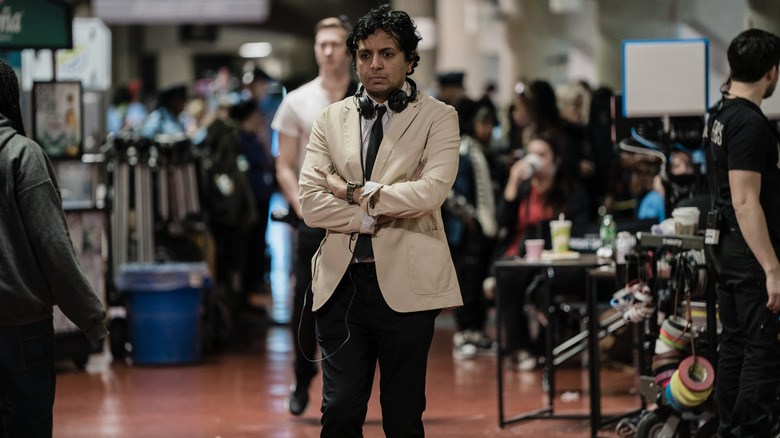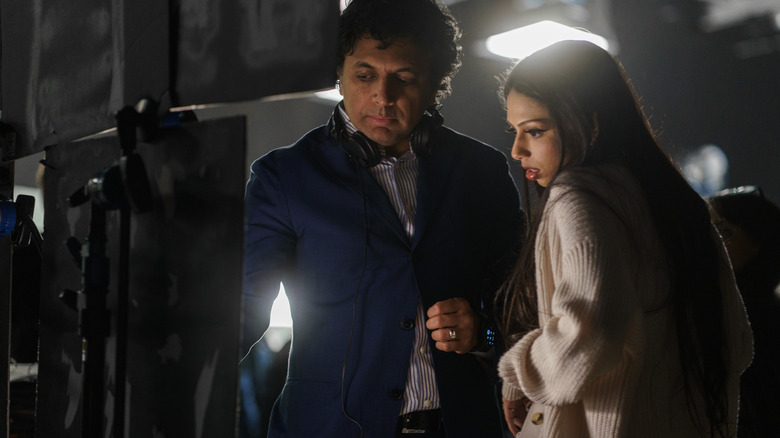Director M. Night Shyamalan's Trap Has A Different Twist You Won't See Coming [Exclusive Interview]
It's not easy figuring out your identity and finding success in the moviemaking business ... let alone at the same time. Take it from M. Night Shyamalan, the rising talent prematurely (and unfairly) crowned "the next Spielberg" on a Newsweek magazine cover in 2002 before he truly had a chance to establish himself. And it's certainly fitting the famous filmmaker gravitated towards "Oppenheimer" star Josh Hartnett as his latest main lead, considering the struggles the actor experienced following his big breakout in "Pearl Harbor."
These factors all converge perfectly in "Trap," Shyamalan's heartfelt Hallmark-movie homage about a loving father taking his daughter to a concert. Okay, fine, so it's actually a tense thriller where this entire event is a trap designed to catch a serial killer. For Hartnett, unveiling this twist in the marketing gave him the freedom to portray a sociopath without a trace of self-consciousness. As he told me in a recent interview:
"When you hear that Night wants you to be in his film, you're like, "Yes, 100%." And then you read the script and you're like, 'Oh my God, if this goes wrong, it's all on me.' [Laughs] And yeah, it was a terrific challenge, but also I love challenges, so I was excited to be a part of it."
In a separate conversation, Shyamalan reveals he didn't even consider this a "twist" to begin with. The real one, as it turns out, was injecting dark humor into arguably his funniest and most wry, self-aware movie yet. What follows are my one-on-one interactions with both, where we discussed the similarities between Shyamalan and Christopher Nolan, the research required to depict a murderer, and even an exclusive that should excite every "The Village" appreciator out there.
Note: This interview has been lightly edited for clarity and brevity.
After Oppenheimer and Trap, Josh Hartnett is going full character actor
With "Oppenheimer," you were part of the fabric of an entire ensemble. In "Trap," it kind of lives or dies based on you. Do you have a preference with either role? I'm going to put you on the spot here.
Josh Hartnett: No, I don't think I do because in ["Oppenheimer"], I was just so happy to be a part of that crew. Because those actors were all amazing and everybody was playing their roles to perfection. And I could never do what Cillian [Murphy] did in that role. Nobody was miscast, everybody was perfect for their role. And to be in a film like that, that has that sort of a scope, that sort of reach that, obviously it wins all those awards and stuff like that, but so many people see it and it starts a conversation. It becomes part of the zeitgeist. And then of course the Barbenheimer weirdness. It was a magical sort of experience.
["Trap"] is a totally different animal, but in a similar way. Working with Night or working with Chris, you're in a very inclusive environment where these directors are so at the top of their game that they want to collaborate. They don't have any fear of other people's opinions the way that some directors who maybe aren't quite as sure of themselves would want to hold more tightly. And so I had a similar sort of relationship with Night as I had with Chris, which is just very open and loving and allowing me to explore, in this one, this very, very, very strange character. Very different from Ernest Lawrence. And I just feel super lucky to be able to — people don't know where to put me these days, so I can go all over the place and try different roles.
This character, he's obviously not a hero, he's not someone where you're trying to garner sympathy from the audience. Do you enjoy that sort of challenge? Is that completely different from what most roles ask of you?
Yeah, I guess I don't really care about garnering any sympathy from the audience. What I do want to do is make people understand why he's doing what he's doing. And in this instance, it feels radical to try and do that because audiences don't usually go along with the serial killer and empathize with him and start to maybe root for him. That was the conceit of the script, and I wanted to preserve that as much as I could, being Night's main actor in this. So yeah, I found the challenge kind of remarkable. But again, I want to play the character honestly and try to make it as credible as possible. Hopefully that will lead to understanding and maybe empathy from the audience.
Josh Hartnett went to some dark places to portray a murderer
Personally, I would put M. Night up there with the Stanley Kubricks, the Steven Spielbergs, with just how they get these performances out of their casts.
Performances, but also just the way that they create tension, the way that they create a space, a mood that most directors can't. And there's a world-building that Night's involved in that is very specific and unlike those other directors, but with that same sort of ability. He's a genuinely genius filmmaker.
Absolutely, and he's known for getting sort of these kind of off-kilter, very specific performances from his lead actors a lot. He has a very specific tone, like you said, and you have to go with it, and you play a large role in setting that tone. Was that something that you guys talked about beforehand, of threading that needle?
Yeah. We talked a lot about how we could make the choices credible enough so that you believe that this guy, who seemingly loves his daughter [laughs] and will do anything for her, [and is] also the serial killer. And not cheat the audience and be like, "Yeah, these two things exist." And for me, a lot of that stuff is a front, and then the front bleeds into his reality. Which is something that happens often, I think, with people who have really intense, forward-facing fronts and their reality of themselves is kind of hidden. Often they become that front. And with him, he's sort of melted into that front so far that he started to have something that's like love for his daughter. But it's probably not love the way that you and I understand it, it's probably more just the way that she reflects onto him, his understanding of himself.
So it's probably — I mean, it has to be, if he's a psychopath — has to be necessarily narcissistic. But he's discovered over the course of this piece ... and it's not just a character study. Of course, this is supposed to be a fun movie. But from my perspective as an actor, it is. And so I feel like this is the day in the life where Cooper discovers that he's not completely a monster, and that's an interesting role to take on.
How much research was involved in this? Were you looking to make this as realistic as possible?
Lots and lots of books, reading about people who are in jail right now for doing this exact same sort of thing.
Any specifics you can think of, off the top of your head?
I read a book early on that was about this guy going into the prison system in England, and there were a couple of serial killers there, lots of people who had committed crimes that were clearly psychopaths, and he went in and over the course of it started to advocate for one of them who thought he wasn't a killer. And turns out, of course he was. He was just really, really charming and very convincing in his portrayal of innocence and his portrayal of just being a normal guy. And I was like, 'That's exactly what's going on here,' and hiding in plain sight and all that sort of stuff. It's interesting. I found the whole research of it was dark, not something you want to do all the time, but something that worked really well for this character and I think hopefully made the character fun and buoyant and real.
M. Night Shyamalan's biggest fan is his mom
I'm ready to call this the Summer of Shyamalan, between "The Watchers" and now "Trap." How much fun has this last year been for all three of you? And do you envision something like this happening again sometime down the line?
M. Night Shyamalan: [Laughs] Yeah, we're always talking about film and talking about art, and it's just the way the house is built. I'm careful to make sure that we're not talking about outcomes. I always tell the girls things like, "The people that win the lottery have such a high rate of alcoholism, divorce" and all this stuff. You want to make sure that you don't label things good and bad. And so all of that's noise. Just you in your art form, that's it. And then everything else that'll happen as a repercussion of that is the correct thing. It will be correct. So when you're writing your song or you're writing your script or whatever it's you're doing, concentrate on your craft in service of expression of the thing you're doing, the character or the thing you're trying to express. Concentrate on that, and you'll be really happy in life.
I love that, handing out that fatherly advice even as a director. I don't know if you remember back when you were doing press for "Old," you and your mom released these clips, and she was trying to get people to go out and see your movie and she hadn't even seen it yet ...
Yes. She's hilarious. Yes. I mean, literally I could just turn the camera on my mom and she will entertain you. On "Old," I did this thing as you were referencing, where I was saying, "Mom, tell them why should they come see 'Old?'" And then she said this, all these things and she's like [affecting exaggerated Indian accent], "It's the greatest movie." And I was like, "Mom, have you seen the movie?" She says, "No, not yet." And then I said, "How do you know it's good?" "Because you are very good." And that kind of thing. And then I said, "Mom, what's the last movie you went to?" And she was like, "Titanic." And so, "You're not much of an expert." She was laughing, but she's so great. Yeah, she's typical Indian mom.
[Laughs] Exactly, as someone who has a similar dynamic, I can relate.
Yeah, exactly. She's like, "Why doesn't the world ..." And no matter what, it's not enough for her. So, it's so sweet. I can't wait to see her after all this, fill her in.
Shyamalan embraced the dark humor in Trap
I want to talk about the marketing for "Trap" specifically, because this was the rare Shyamalan movie that gave away the twist ahead of time. Was that something that was you knew was going to happen when you were writing the script or was it something you realized later on during that process?
Oh yeah, I don't really think of it as that. That's the premise of the movie. So it's the premise of the movie that ... the thing is, you're watching it from the point of view of someone unexpected, is really what the movie's telling you. Not necessarily a plot point, but his feeling, like what's unconsciously happening is, you're identifying with him as you're finding out the premise of the movie. So that's actually the funky twist of it, is not the information, that he's in a trap or that he's the killer — it's that you are the killer.
I feel like with your movies, they have this through-line of characters being thrust into situations that they weren't expecting, and then having to make hard, even morally ambiguous choices. And this was an inversion of that, with us having to identify with Josh Hartnett's character. How much fun was that for you to write?
You know, I've always had this penchant for doing dark humor. Kind of, "Oh wow, should I be laughing at this? This seems ... " And I giggle over that kind of stuff. Even when I was a kid, whatever, making my other cousins scared. It's kind of, "That wasn't very nice, but it's funny." [Laughs] And so I have that in me and I only started really fully embracing it ... I did a lot of humor in, let's say "Stuart Little" or "Signs." And "Signs" was probably one that I added the most humor up to that point. But it's my instinct now and from "The Visit" on, I've added it into everything. And I think nervous laughter is a really fun thing. And because when we go see the movies in the theater together, it's so joyous to hear everybody laughing and then that turns into gasps and that turns into screams and applause, hopefully.
My final question for you: "The Village" has had this critical reevaluation over the years, I don't know if you're aware of that or not. People are calling it your masterpiece, and it's great. I love seeing that.
Yes, a lot of people keep coming up to me on the street.
It doesn't have a 4K or a Blu-ray release yet, though. Is that something ... ?
I'm on it. I'm on it. Yeah, no, that's my next thing.
You are, okay. Love to hear that.
[Laughs] Yeah, exactly. That's interesting that you asked — yeah, I'm literally on it right now to get a 4K release.
"Trap" is in theaters now.
